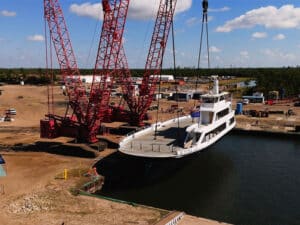
Pioneering e-ferry Ellen will get a new Echandia battery system
Written by Nick Blenkey
Photo: Ærøfærgerne
Echandia has been selected to deliver a new battery system for the pioneering Danish e-ferry Ellen. Delivered in 2019 and operated by Ærøfærgerne, Ellen was the world’s first long-range, pure electric ferry and a symbol of zero-emission passenger transport. The vessel operates to and from the island of Ærø in southern Denmark. In 2022 it set a record by becoming the world’s longest-range fully-electric ferry by sailing 50 nautical miles (92 kilometers) on a single battery charge.
Now, at eight years of age, the original NMC (nickel manganese cobalt) battery system will be replaced due to uneven wear and reduced capacity. Ærøfærgerne has chosen Echandia as supplier of the new battery system following a tender. Scheduled operation with the new battery system will be in May 2026.
Echandia will supply a 3.2 MWh LTO battery system to replace the previous 4.3 MWh NMC system. The new system is designed for a 15-year lifetime and features multiple daily fast-charging cycles at high efficiency.
“We are very pleased that Echandia has secured the tender. We see them as a trusted partner with a well-suited battery system for this type of application. The Echandia solution meets our requirements for long lifetime, high roundtrip efficiency, and maximum safety,” says Allan Filtenborg from Ærøfærgerne.
Echandia’s LTO (lithium-titanate oxide) technology is well-suited for high-frequency, fast-charging RoPax ferry operations, where reliability is critical. The system supports very high C-rates, enabling over 20,000 charge cycles and charging in around 25 minutes. It is an improvement of 10 minutes per charging session.
“This project demonstrates Echandia’s knowledge and other capabilities as an established marine supplier,” says Torbjörn Bäck, CEO at Echandia. “We will deliver and commission an optimized complete battery system within six months, making sure the vessel is ready for summer operations 2026.”
Echandia says that the Ellen battery replacement project proves that upgrading earlier-generation batteries with modern systems is both technically and financially viable, offering longer lifetime, higher efficiency, and the highest standards of safety.




